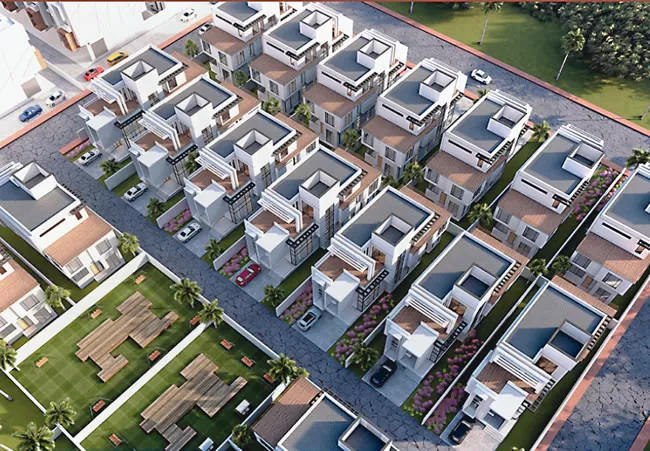At Karsana Estate in Abuja, one of the Federal Government’s flagship mortgage-backed housing schemes, the empty rows of completed houses tell a familiar story. Despite efforts to revitalise Nigeria’s mortgage market, most property developers still avoid mortgage-linked housing projects. Instead, they prefer cash-based or off-plan transactions that promise quicker returns and fewer complications.
This persistent reluctance has deepened the mismatch between supply and demand—leaving an oversupply of luxury homes for cash buyers and a chronic shortage of affordable housing for Nigerians who depend on long-term financing.
In developed economies, mortgage financing underpins homeownership. Developers construct homes, banks provide mortgage loans to buyers, and the developers are promptly paid. But in Nigeria, this cycle breaks down.
Private developers rarely engage with mortgage institutions. Most rely on short-term commercial loans with interest rates of 20–30 per cent—making it nearly impossible to tie up capital in mortgages that span 10 to 25 years.
According to the Real Estate Developers Association of Nigeria (REDAN), the country’s mortgage-to-GDP ratio is less than one per cent, one of the lowest in Africa. By contrast, South Africa’s mortgage sector contributes about 20 per cent to its GDP.
A senior REDAN member who requested anonymity explained the challenge succinctly: “Developers can’t afford to wait a decade for repayment. Inflation and high interest rates make that business model unsustainable.”
For potential homeowners, mortgage terms are just as daunting. Lending rates range from 18 to 25 per cent annually—far beyond what most middle-income earners can afford. Even the National Housing Fund’s six per cent loan scheme has limited reach and suffers from lengthy approval processes.
The shorter tenures common in Nigeria—typically 15 to 25 years—further inflate monthly repayments, while developers complain that banks often delay disbursements or alter terms midway through a project. This lack of reliability has eroded trust on both sides, creating a cycle where developers avoid mortgage-backed buyers, and banks, in turn, hesitate to fund developers.
The Nigerian Mortgage Refinance Company (NMRC), established in 2014 to inject liquidity into the market, has yet to achieve the desired impact. Limited capital, few mortgage originations, and the dominance of informal financing have restricted its reach.
Without a functional secondary mortgage market, lenders struggle to refinance existing loans or attract new investors. As a result, developers rely on private equity and self-financing—models that naturally favour high-end developments and cash-ready clients, including diaspora investors.
Beyond financing issues, land administration remains a major obstacle. Securing valid titles and approvals is slow, expensive, and bureaucratic. Since many urban lands are held under customary tenure without proper registration, they cannot easily be used for mortgage-backed projects.
This pushes developers to operate within informal frameworks—selling directly to buyers who can pay upfront or through short-term instalments rather than long-term mortgage plans.
Nigeria’s real estate sector, valued at over ₦41 trillion in 2024, now ranks as the third-largest contributor to GDP after trade and crop production. Yet, mortgage penetration remains abysmally low.
Data from the Federal Mortgage Bank of Nigeria (FMBN) show that between January and July 2025, ₦60.46 billion in mortgage loans were approved—barely making a dent in the estimated 22 million-unit housing deficit.
Only about 32 primary mortgage banks operate nationwide, and most cater to niche or high-income clients rather than the mass market.
Most Nigerians lack the steady income or credit profile needed to qualify for mortgage financing. With a large proportion of the workforce engaged in informal employment, documentation such as payslips and tax records is often unavailable.
Rising construction costs further compound the problem, pushing housing prices beyond the reach of average earners.
Olajide Dosunmu, Chief Executive Officer of Noble Ground, described the situation as “a long-standing structural challenge.” He, however, welcomed the Ministry of Finance Incorporated Real Estate Investment Fund (MREIF)—a public-private initiative offering mortgages at 9.75 per cent for up to 20 years—as “a genuine step in the right direction.”
“Processing now takes about two months,” he said. “You only need to pay 10 per cent upfront and show that your income is at least three times your repayment amount. The challenge, however, is that many people still can’t afford even that.”
Dosunmu urged the government to promote cost-effective construction materials such as mud and hydrofoam blocks to bring down overall housing costs.
Realty Point Limited’s Managing Director, Gbadebo Adejana, argued that mortgage-linked housing must be integrated from the earliest design stage. “If a project isn’t structured around mortgage financing from the beginning, it’s difficult to make it work later,” he said.
Former chairman of the Nigerian Institution of Estate Surveyors and Valuers (NIESV), Dotun Bamigbola, shared a similar view. “Most developers prefer cash transactions because they offer faster returns,” he noted. “Off-plan sales have become the substitute for mortgages, allowing buyers to pay over a shorter period during construction.”
Experts agree that deepening mortgage financing is critical to expanding homeownership in Nigeria. That will require coherent policy reforms across federal and state levels, recapitalising mortgage banks, improving credit scoring systems, and streamlining land titling processes.
Until these structural challenges are addressed, developers will continue to favour cash-based models—leaving millions of Nigerians locked out of affordable, mortgage-backed homeownership.



